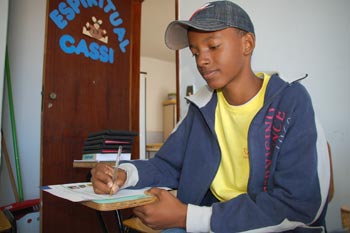From Sponsored Child to Compassion Employee
Veerachai Nimmitthamrongkul, more commonly called Bee, was sponsored by Compassion when he was growing up. But now Bee has been working as a Partnership Facilitator (PF) for Compassion Thailand for six years.
 Bee still recalls the letters he received from his sponsor from Canada. The letters always encouraged him to keep on studying and stressed the significance of education.
Bee still recalls the letters he received from his sponsor from Canada. The letters always encouraged him to keep on studying and stressed the significance of education.
The support and letters of encouragement from his sponsor enabled Bee to break free from the chains of poverty.
Now Bee has been blessed with the opportunity to serve the Lord in ministry.
Bee’s life was radically transformed because of his sponsorship, and he now gladly serves as a bridge between sponsors and children.
He hopes that each sponsor can make a difference in a child’s life in the same way that his sponsor dramatically transformed his.
A typical day for Bee starts at 6:30. He wakes up and spends about an hour getting ready for the day.
At 7:30 he leaves the quiet and tranquility of his room and heads to his busy and activity-filled job at Compassion.
Every morning Bee starts work with a time of devotions with fellow staff from 8 to 8:40.
Then he begins work. Bee juggles many tasks as a PF. (more…)
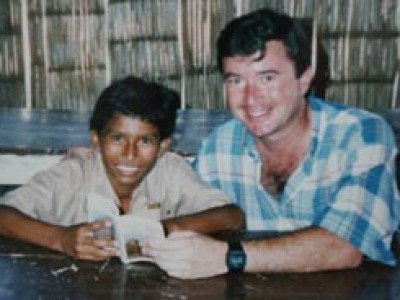
Committed Love Moves a Sponsor to Ecuador
Allen Charles Graham is single, but he understands the meaning of the word “commitment.” He started sponsoring children in 1989 when he lived in the United States, working at a TV network. Currently, he lives in Ecuador and is the Training Director at HCJB Global Voice radio station.
“This was something I always wanted to do ever since I looked at the advertising spaces in some magazines.”
Allen had the opportunity to take a closer look to the blessing of sponsoring children when he came to Ecuador for the first time back in 1989 as a “working visitor” for HCJB. He was assigned a prayer partner, who happened to sponsor an Ecuadorian child.
When the prayer partner visited his sponsored child at the coastal city of Guayaquil (260 miles from Quito), he came back and he showed pictures to Allen and shared about that experience.
That was when Allen received that special motivation and knew he was going to commit to sponsor a child as soon as he went back to the United States.
Actually, that was one of the first things Allen did when he was back home. He looked for a Compassion ad in a magazine, cut the invitation to sponsor a child, filled it out, and sent it including this note: “I prefer an Ecuadorian child.”
“In September 1989 I received a package with the information of a boy, Marcos from Guayaquil.”
This boy, the first child he sponsored, was 10 years old.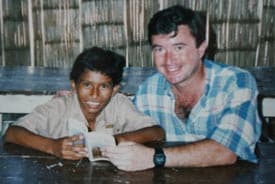
Surprisingly, a couple of months later in 1990, Allen received an invitation to give some lectures at the English Fellowship Church in Quito. Of course, he took the opportunity to visit Marcos.
So in July of that year, Allen met Marcos in Guayaquil. Marcos was 11 years old by that time, and he just talked and talked all the time.
“I didn’t speak Spanish and Álvaro, the translator, couldn’t translate fast enough all the things Marcos said.”
Sign language and, most of all, the language of love … hugs, tickles and smiles, let Allen and Marcos establish a strong friendship bond. When they were saying their good-byes at the airport, Marcos said, “I will pray a lot for you to come back to my country.” … And God did answer his prayer!
Allen was called by God to move to Ecuador as a missionary. In March 1992, HCJB accepted his application and later that year he traveled to Costa Rica to learn Spanish.
August 19, 1993, is a day Allen will never forget since it was the day he arrived in Ecuador after a special call by God. He was not just willing to be a missionary with HCJB, but was yearning to see little Marcos again, for Marcos had stolen his heart, and God had listened to Marcos’ innocent prayer.
Since that time, Allen has sponsored a half dozen children. He is currently sponsoring two children — a girl in Ecuador, Mariuxi, and a boy in Bolivia, Pedro.
From all those children, Marcos is the one who left a very deep imprint in the life of this communicator highly committed to children.
At the present time, Marcos is 30, and this sponsor/sponsored-child relationship has evolved almost into a father-son relationship. (more…)
Pengucapan: Indonesian Thanksgiving
Every year from June until September, the people in Minahasa, North Sulawesi, Indonesia, have celebrated a traditional thanksgiving holiday from generation to generation, called Pengucapan. It is the way the people of Minahasa express their gratitude to God for the blessings of the previous year.
The Pengucapan tradition started when the people in this remote area of Indonesia still worshiped gods. They expressed their gratitude to the ultimate god or the highest god, known as opo wanatas empung walian empung rengan-rengan.
After the harvest, Minahasa people held a kuman kan weru ceremony to eat their harvest for the first time and express their gratitude though song and praise to their gods for fertility, good weather, harvest and health. They would bring their crops as an offering to their gods.
Christianity came to Minahasa in the 1800s, and Minahasa now has one of the highest rates of Christianity in all of Indonesia.
Pastor Philep, who works with a Compassion child development center in Wiaulapi, explained that after Christianity’s arrival, the Church rejected all forms of worshiping gods as part of animism. But the Church at that time saw the expression of gratitude that Minahasa people had in this tradition and allowed them to continue it through churches.
With the presence of the Church, the form of kuman kan weru changed. (more…)
Love Thy Neighbor (in Action)
A teacher of the law walks up to Jesus while He is teaching and asks Him, “Of all the commandments, which is the greatest?”
Jesus says to love the Lord your God with all your heart and with all your soul and with all your mind and with all your strength. The second greatest commandment is to love your neighbor as yourself.
The teacher of the law responds to Jesus, agreeing with what He has said, and then in understanding also states that these two commandments are “more important than all burnt offerings and sacrifices” (summary of Mark 12:28-34).
I have found that this act of love, to love our neighbor as our self, is no mystery. It is the living, breathing body of Christ working within the power and capacity of the Lord. Hurting when others are hurt, rejoicing when others rejoice.
We walk forward and love with love that has been poured on us, our hearts made sensitive to the needs of those around us.
We are intricately connected, I believe more so than we even suspect. We are one body, the Bride of Christ, each one of us examples of Christ’s love.
I expound upon this for a reason; I recently heard a story at Compassion in a meeting that left such awe resonating in my heart. So much so that I went and hunted down the pictures, the full report,* and then I requested to share it with you.
It is an account of the body of Christ in action, the call to love our neighbor being fulfilled.
Breathing was extremely difficult and oxygen had to be administrated 24 hours a day. His daily life had to be overseen 24/7 and the worries of the medics grew day after day as Stuart had to struggle with an illness called subglottic stenosis.
Subglottic stenosis causes the throat to narrow and makes the breathing process complicated, and for Stuart restricts his life to 50 percent of normal capabilities.
Stuart has suffered from this illness since he was 3 years old, and as the doctors in Nicaragua examined his case, they realized that the appropriate treatment could not be done there but rather only in Europe.
Dr. Erick Castillo (Compassion Guatemala’s Health Specialist), worked closely with Dr. Nubia Figueroa (Compassion Nicaragua’s Program Implementation Manager) sharing reports about Stuart’s health status, and found in Guatemala a medic who could fulfill this surgery and suggested this new option.
Reluctantly, Stuart’s mom agreed to travel to Guatemala, but later regretted her decision and turned down her permission to let Stuart travel. Her fear was that this surgery leaves a small open hole in the patient’s throat for at least one year, depending on the alimentation and care that he is given.
Eventually, though, Stuart was able to travel to Guatemala and had this laser surgery that resulted in a successful outcome for his life!
Ingrid González (Compassion Guatemala’s Curriculum Specialist) opened her home doors for Stuart and his mother while he was recovering from this surgery, and along with Erick Castillo, treated him the very best they could by praying, giving encouraging words and striving to help them feel at home as they were in an unknown country.
Compassion Guatemala, through its Country Director as well as the local office’s prayer group and many of its staff, constantly monitored Stuart’s case to see how he was doing. Stuart received many gifts from the staff and was even taken to church and then to an outing by one of the staff members on a beautiful Sunday.
Stuart continues to thrive in life, and his health is continually improving since his surgery.
Dr. Castillo and Dr. Figueroa continue to oversee Stuart’s health by sharing mutual reports, since Stuart must return soon to Guatemala for his respective medical follow-up to make sure everything is all right, especially the small hole left in his throat.
Compassion Guatemala continues to advise our partners in Nicaragua to give Stuart proper support, from his student center to his home.
Stuart’s birthday was June 9, the first birthday that he did not spend in a hospital. What a beautiful thing!
The command to love our neighbor as our self is a great task but one that can result in victories … even in saving lives.
And let us remember how Jesus responded to the man who acknowledged the beauty of the command:
“When Jesus saw that he had answered wisely, he said to him, ‘You are not far from the kingdom of God.’” – Mark 12:34 (NIV)
*Stuart’s story was written by Samuel Llanes in the Compassion Guatemala office.
My Best Day in Ministry: Praying for God’s Purpose
Joseph Mayala is the Compassion Tanzania Country Director. He shares about his best day in ministry, a day the Lord spoke to him.
Letter Writing: Love Has No Borders
Letters are the closest connection that a child can have with her or his sponsor. The donation you faithfully give each month provides the financial support for your child’s development, but your letters provide beyond the material — needs such as love, hope and possibilities.
If poverty had a face, in Brazil it would be the face of a child. According to UNICEF, in 2004 more than 50 million Brazilians were living in poverty — without access to basic needs such as potable water, health care, good nutrition, education — and facing high rates of unemployment and violence.
Nearly 30 million of that number were children and adolescents.
In that same year, 800,000 children from 7 to 14 years old living in these conditions were not attending school, most of them from illiterate families who have no way to help their children in their education. Without encouragement, it is easy for them to just abandon school and start working in order to help their families.
It is an endless cycle as these same children one day will grow up and have their own children.
But there is hope, and your sponsored child knows exactly where to find it. Your sponsored child goes to her or his room, gets an old box full of photos and letters from under the bed, and as this child starts reading a new breath of life fills the heart.
“The letters from the sponsors are very important on children’s social and cognitive development,” says Maura, director of Lar Batista de Crianças child development center.
“Through the letters they have access to another culture and language, learn how to communicate well by speaking or writing, and moreover, they learn about affection and respect. To love and be loved.”
For that reason the correspondence monitor at the child development center also talks with the children about geography and history from their sponsor’s countries.
Luiz is 12 years old and loves getting letters from his sponsors, a couple from Australia.
“I feel that I am a very important person when I say at school that I have friends from another country and we send letters to each other. I also like to know that I pray for them, they for me and God listens to us.”
.
One of Luiz’s classmates at Lar Batista de Crianças is also sponsored, but the 11-year-old boy has only received one letter in the two years he has been sponsored.
“I feel sad and sometimes frustrated. I’d really like to know about my sponsor’s life, such as: Where does she work? Is she married with kids? What are her hobbies? Does she have a pet? Things that my teachers cannot answer for me.”
According to Maura, children get excited when they receive their letters. “They gather together and tell to one another what their sponsors wrote to them. It is a joyful moment for each one of them.” And such a moment is special not only for the children, but for all the people who make this relationship happen.
Marta has been working as the correspondence monitor at Projeto Vilamar child development center since 2000. She says that her job is full of challenges, but she understands she is playing the role of a bridge between two people who love and care about each other.
“There was a specific letter that touched my heart. A sponsor whose wife had passed away wrote to his child telling about his pain. I started crying and also the child … at that moment I understood that even living so far from one another we can feel and share feelings with a friend we love.”
To most of our child development centers’ staff in Brazil, the improvement children show in their behavior is visible from the moment they get sponsored.
“They have to concentrate to write well, which makes them think about what they are writing. They are automatically compelled to learn how to write and read correctly. Also, the fact that they have somebody concerned about their lives also makes most of them avoid bad company, drugs and youth delinquency. They cannot accept disappointing their sponsors.”
In the spiritual area, children recognize that the same Lord they worship in Brazil is worshiped overseas.
Very shy, 12-year-old Maria loves to talk about Jesus with her sponsors, a couple from the United States.
“We used to write about our dreams and day to day. But what I like most is when they teach me new things about God’s word.”
Vitória thanks God for her sponsor’s life –- an 80-year-old lady who loves the 11-year-old girl as her own granddaughter.
“She asked me to call her grandma, and that is exactly how I feel about her. She is part of my life and family, even though we never spoke personally. I care about her letters so much that I have a special place for them, inside a drawer … for me, love has no borders.”
One Day in the Life of a Tours and Visits Team Leader (Part II)
Sorry for so abruptly abandoning you yesterday. Please rest assured that if you’re ever on a tour with me, I won’t do that to you. 🙂
So, where did I leave off? Oh yes – 10 a.m.
10 a.m. Training with church partners that will be visited by another tour arriving in a few weeks. We asked six directors to come but most of them are late.
When I start 30 minutes later, I can’t go fast due to the fact that this will be a visit to their centers and they have a lot of questions.
I give them examples of what to do and what not to do, and encourage them to ask questions.
They are very excited for the visit and have a lot of enthusiasm and suggestions. Great!
But still we have to provide several guidelines. For example about the food.
We need to avoid too much spice, raw salads or any other thing that causes problems, and at the same time, not eat chicken every day.
Luckily our food is wonderful and we have lots of choices, but we cannot serve guinea pig or our best seafood dish, ceviche. Not all visitors are so adventurous to eat an animal they would view as a pet, or raw fish with chili.
Besides food, there are other intercultural issues to manage.
Time is a more relaxed concept in Peru and in all South America. To be sure that both standards meet, I tell church partners to be ready half an hour in advance. This way, they are really ready when we arrive … most of the time.
I often call in advance, though, and sometimes I have told the driver to go slowly while I point out some interesting views on the road to gain some time.
Also, for home visits I’ve learned that “accessibility” is quite a different concept for center staff, who are used to going up and down the hills – though per the visitors report, I should call them mountains – without using stairs.
I have learned to be suspicious when they say that the house to visit is located “aquicito nomas” (or very, very close).
I ask them to provide at least one house that is really close and in a flat area. They tell me that all are accessible by mototaxi, (a motorbike that pulls small car with a seat for two people), but still I ask for the names of the children to be visited and give ideas for the grocery bags we will give away at each home visit.
Another difficulty is finding the best way to communicate our ideas to the center staff. They are very loving and committed people, but many of them do not have higher education. However, they have a lot of resources and are very creative. But still, I need to set clear guidelines.
1 p.m. Lunch with the center directors. They continue to ask questions about the visit, and Elia and I continue to answer. As we usually translate in lunches and dinners, we know the art of talking and eating at the same time, so this is no problem.
The center staff are very friendly and excited, so they talk a lot.
2 p.m. We continue with the training. The directors make a draft program for the visits; each one now knows what we will see at their child development center: Child Survival Program mothers and babies, new center, older center, kindergarten children, boys and girls, teenagers, workshops, Leadership Development Program students, former participants of Compassion’s program, home visits, etc.
In this way, the visitors will have the whole screen of Compassion work. Some centers also have children who will attend the fun day to meet their sponsors.
Now the coordination is made and, God willing, all will be ready when we visit the centers in some weeks.
Then I get an instant message from the Global Ministry Center, but I explain to that person that I am in a meeting and I see if he can wait. We agree to talk when my training is over.
3 p.m. Back at my desk. I have time to write down clearly some of the ideas the church partners had in the meeting. This will improve the materials for future training.
Another instant message. I see what they need and answer. However, I am not ready to answer all of it, as some answers have not arrived from the centers yet. I have to ask for more time.
I try to make one urgent call to answer, but the center does not work today so I have to wait until tomorrow.
3:15 p.m. My manager calls to get an answer about the approval for a tour request for next year. (more…)
One Day in the Life of a Trips and Visits Team Leader
My name is Soledad Agreda, and I am the Trips and Visits Team Leader of the Peru office. I have been doing this work for about a year and a half now, and my main responsibilities are to organize, facilitate and host individual sponsor visits and trips along with Elia Sipan, the Trips and Visits Specialist.
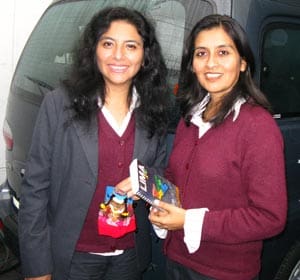 Our positions are thought to be some of the most exciting in Compassion. We get to go out a lot, travel on a regular basis, go to nice dinners and get to know many interesting people. It is true, my position involves these things, but it is actually much more.
Our positions are thought to be some of the most exciting in Compassion. We get to go out a lot, travel on a regular basis, go to nice dinners and get to know many interesting people. It is true, my position involves these things, but it is actually much more.
With the purpose of giving a better understanding, I will describe one day in my life, but I would like to give some more information about me first.
I am single and still live with my parents and my brother. I have been working with Compassion for 12 years now.
Because I worked as a translator for children and sponsor letters before becoming an employee, when I became an employee, I started working with correspondence. However, my previous manager, who is now the country director, encouraged me to focus on sponsor visits as I had the skills of fluent English, intercultural experience and getting along well with people.
So I have been in sponsor visits since the very first year I joined Compassion. Besides the fact that I really like children and enjoy being with them, one reason I decided to work here is because I felt at home with Compassion.
As a result of my work, I have learned that I can do more things than I ever expected.
At first I did not know I could become a Trips and Visits Team Leader. In fact, the position did not even exist at that time. But as I worked through the years, I overcame some of my limitations (like not knowing Lima well; now I have a map in my head) and built my strengths (like my love for reading and history, a great help to answer questions and provide information).
Also, I have seen the faithfulness of God in the ministry and in my life and how He has taken Compassion and me beyond what we expected.
I believe we really have the opportunity to deliver children from poverty. And I still remember many years ago, while I was translating for a video, I asked the final question to the young mother we were interviewing: “What do you want for the future of your child?”
She held the 4-year-old girl, looked around the one poor room she called home, and seemed to think how trapped she was there, with a husband without a steady job, no education and the first of many children to come already in her lap.
Then she stared at me while she answered: “I want her to have a life different than mine, that she can study and progress … I do not want her to have my same life.”
So that is why we work. That is why I am here.
If I could tell you one thing it is that you should know how important you are for the children and how sad they feel when they do not get any correspondence.
Money means a lot, but emotional support and care is even more important for reaching our goal, which is what this mother mentioned: to give our children the chance for a different life.
Now let’s see what a day can be like for me. (more…)
Now He Smiles
In 2008, little Eric was the first child registered at Rio Tuba Learning and Development Center in the Philippines. I was there. And I recently went back to see how he is doing.
To reach Eric’s far-flung town, I traveled by plane, took a 30-minute motorcycle-taxi ride, and then a grueling six-hour bus ride on a dusty, monotonous rough road.
I was warmly received by Pastor Gwen, who immediately said she remembered my last visit. She also said Eric has improved much. His father, Benny, however, has been very elusive.
Pastor Gwen has tried several times to reach Benny to discuss matters about sponsorship, but he’s never home. His children always say he’s out looking for food.
 The next morning I saw Eric in his tutorial class at the student center and immediately noticed a big difference – he was smiling at me!
The next morning I saw Eric in his tutorial class at the student center and immediately noticed a big difference – he was smiling at me!
There was a toothless gap in his big grin, and I was very happy to see it.
I approached and asked if he remembered me from my last visit. He said no.
I observed Eric in class. He was the quietest and most well-behaved.
The other children were typically rowdy, but Eric went about his quiet way, listened to the teacher attentively, colored some drawings as told, and took his morning snack.
As in all student centers throughout the Philippines, Rio Tuba plans and conducts many activities for the children. The goal is to connect with each individual child so that each hears the Gospel and learns Bible stories and songs, is monitored for health, receives school tutorials, and is given a chance to just play, eat, enjoy, feel loved and feel safe.
Simply put, each child is given the chance to live a happy life so that all of them, like Eric, can begin to smile.
I learned that 6-year-old Eric comes to the center after his regular elementary school classes. He is in grade one. We grabbed a quick lunch, and it was time to meet Eric’s family again.
Pastor Gwen had briefed me on how the student center performed in its first year of partnership with Compassion. So naturally I wanted to know if all that she said was true for Eric’s family. (more…)
A Typical School Day for Brenda
In Uganda, the name “Makerere” is synonymous with Uganda’s oldest and most prestigious institute of higher learning: Makerere University. The university sits on Makerere Hill and is not only revered for its students’ academic proficiency and health education, but also for the spacious, manicured lawns and modern buildings that constitute this seat of learning.
In the slum community of Makerere Kivulu that lies in the shadow of this prominent institute, the storm drains overflow with filth and stinking water between rows of shacks made of planks and rusty iron sheets. The dilapidation of these structures is set off by the stable buildings surrounded by high stone walls that dot the area.
Many of the people in the community are unemployed, and even those who are employed are underemployed, dealing in small businesses like hawking goods, frying and roasting food like cassava, and selling vegetables like tomatoes and eggplants.
Most of them earn a maximum of about a dollar a day. In despair, many of the women look to prostitution to earn a living, and the men resort to alcohol and spend their days drunk. The youth form gangs and go about stealing and indulging in drugs.
It is this community that 13-year-old Brenda wakes up to every morning at 6 a.m. (more…)
Jaimito: A Day in His Own Words
Jaime is 11 years old and lives in the La Prosperina neighborhood. He had the happy opportunity to be registered at Jesús es Amor Student Center about six years ago.
Jaimito, as many of his friends call him, is a very joyful, outgoing, obedient and disciplined child. He truly loves his parents and siblings, and most of all he has surrendered his heart to God.
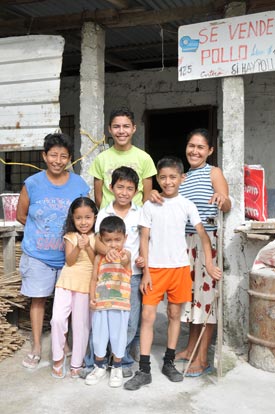 Jaime and his four siblings — Jesús (16), Jonathan (9), Allison (5) and Aarón (3) — live with their parents, Jaime and María, in the basement of a humble house. Jaimito’s grandma on his dad’s side gave the house to the family 16 years ago. It was once a warehouse full of old and useless stuff, but now it is Jaimito’s home.
Jaime and his four siblings — Jesús (16), Jonathan (9), Allison (5) and Aarón (3) — live with their parents, Jaime and María, in the basement of a humble house. Jaimito’s grandma on his dad’s side gave the house to the family 16 years ago. It was once a warehouse full of old and useless stuff, but now it is Jaimito’s home.
Jaime’s father doesn’t have a steady job. He’s an artisan who makes plaster layers that are used in roofs in most houses on the coast. Currently, he works at a little artisanal factory. He makes U.S. $40 every week.
On the other hand, María, Jaime’s mother, doesn’t work. She does all the chores at home and takes care of her five children. She would love to find a job that would enable her to sustain her family too.
María graduated as a nurse’s helper a short while ago. She took a one-year course at a local institute.
Jaimito: A Day in His Own Words
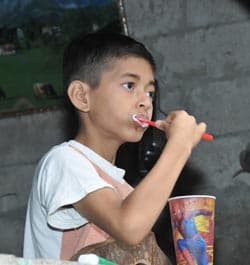 Normally, I get up at 6:30 a.m. and get myself ready to go to the center. I wash my face, brush my teeth, and then have breakfast with my family.
Normally, I get up at 6:30 a.m. and get myself ready to go to the center. I wash my face, brush my teeth, and then have breakfast with my family.
My mom usually puts a cup of coffee and a piece of bread or some crackers on the table for each of us. Breakfast is the coolest time of the day because my entire family is there.
After that, I take my medicine — the one that the doctor prescribed. She’s the doctor from the center. She’s really kind and always treats me nicely. She also encourages me a lot. I know she will totally help me to get well soon.
I leave for the center around 8:30 a.m. (more…)
God’s Little Girl Strives for Excellence
Excellence is answering God’s call to the best of our abilities with the gifts and resources He has given us. It is carrying out God’s work with an attitude of enjoyment.
Thanks to the Leadership Development Program* (LDP), Talita is living in the best moment of her life, not only professionally, but also spiritually. Her life story is about striving for excellence. Her dedication makes her an example to be followed by others and a reference of struggle and Christian character.
Petite and delicate, 20-year-old Talita teaches the 5- and 6-year-olds at her former child development center. God, the Father, has made her a great woman.
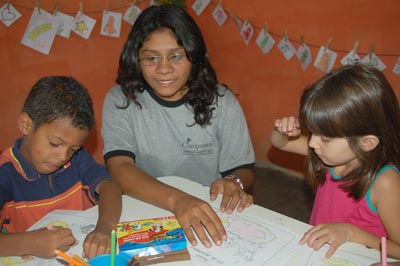
The public system of education in Brazil is full of contrast. The best universities are public, and to be accepted in to one, the student has to have a good and strong education during high school. But when talking about a young person who’s attended a public school, the odds are small.
Public schools are the worst ones and rarely prepare for the next step. Besides all the hardship and risks children in poverty have to face, their academic and professional path can be compromised due to the lack of good education.
Talita attended a public school in her town, Tauá, a small city about 330 kilometers from Fortaleza – the capital of Ceará state. But different from most of the students of lower class who barely finish their studies in order to get a job and help their families, she devoted herself – and still does – to study. She overcame the statistics and got a vacancy in a public university – the “Universidade Estadual do Ceará” (University of Ceará State). (more…)

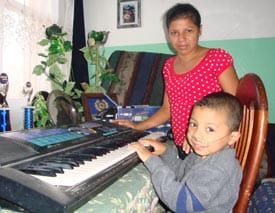 Reluctantly, Stuart’s mom agreed to travel to Guatemala, but later regretted her decision and turned down her permission to let Stuart travel. Her fear was that this surgery leaves a small open hole in the patient’s throat for at least one year, depending on the alimentation and care that he is given.
Reluctantly, Stuart’s mom agreed to travel to Guatemala, but later regretted her decision and turned down her permission to let Stuart travel. Her fear was that this surgery leaves a small open hole in the patient’s throat for at least one year, depending on the alimentation and care that he is given. 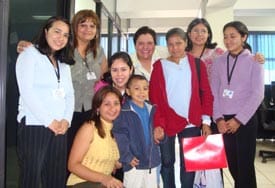 Compassion Guatemala, through its Country Director as well as the local office’s prayer group and many of its staff, constantly monitored Stuart’s case to see how he was doing. Stuart received many gifts from the staff and was even taken to church and then to an outing by one of the staff members on a beautiful Sunday.
Compassion Guatemala, through its Country Director as well as the local office’s prayer group and many of its staff, constantly monitored Stuart’s case to see how he was doing. Stuart received many gifts from the staff and was even taken to church and then to an outing by one of the staff members on a beautiful Sunday. 